
HughesNet Vs Viasat: Which Internet Service is Better?
In many cases, especially if the individual resides in a rural or remote area, the current available options, such as cable or fiber internet, are not available, and satellite internet is the only available service. Two types of satellite internet providers are mostly used: HughesNet and Viasat. Thus, the question arises as to which of the two is better to choose. Below is a side-by-side comparison of the two satellite internet services based on some issues that will help you make the right decision.
Speed and Data Limits
In a general view of the focus on speed and data, it can be said that Viasat is usually ahead of HughesNet. The top-of-the-range plan marketed by Viasat has download speeds of up to 100 Mbps and offers unlimited data. The basic plan gives users a speed of 12 Mbps and a 45GB data allowance. For example, HughesNet offers 25 Mbps with 50 GB of data per month as its top speeds that are advertised. Unlike HughesNet, Viasat allows you to experience faster speed with unlimited facility on the higher packages.
However, it should be noted that the satellite internet service providers often represent the listed speeds as the maximum speeds, which may no longer be available when many people are connected to the internet. However, both Viasat and HughesNet systems employ data capping as far as data usage goes once the user hits a given data usage threshold within the billing cycle to ensure optimal network functionality. Thus, in the baseline experiment, in which Viasat has no data limit, the speed could still be reduced in case of congestion. It also has more latency than terrestrial internet services, which form part of the technology.
Reliability and Consistency
In terms of dependability and stability, HughesNet often seems to be superior to Viasat, which is its direct competitor. HughesNet also provides that it has 99.9% network reliability and the company does not have what is locally referred to as ‘peak hours’ that will reduce the internet speeds. On HughesNet, customers have stated that they experience fewer sharp declines in speed during normal peak hours. By contrast, Viasat is rather blatant in marketing their network as having been optimized for peak usage from 5 pm to midnight, when downloads will be slower, as stated. On balance, HughesNet is rated higher for steady internet connection speeds at various times of the day.
Network Coverage
The two internet service providers are Viasat and HughesNet, both of which offer service in the continental United States of America and parts of Canada and Mexico. What do we know about Viasat? Well, it is available to more than 98% of the US population. HughesNet also boasts about its national coverage, but there could be some gaps, especially in some fairly isolated regions of the Western states. As for the overall coverage regions of satellite internet, both providers tend to provide more extensive regions, making the two more similar. Potential buyers should note that details available by state and address are available.
Pricing and Contracts
HughesNet and Viasat do not differ much in the pricing or the contracts offered to customers. The basic packages begin from $60 per month with the Viasat satellite internet service. HughesNet begins at only $59.99 a month. These base levels of plans and prices are more or less in a similar range for both companies. The higher tiers are those with more data allowance and faster connection speeds, which range from a few hundred dollars per month. It is equally important to remember that taxes and fees are also incorporated into the plans’ advertised pricing. Customers should only be able to compare the all-in pricing when evaluating the companies.
The two providers operating within the satellite network industry, Viasat and HughesNet, use a similar standard of fixed 24-month contracts for their subscription services. This means that you cannot easily cancel the service without incurring steep early termination fees before the expiry of the agreed contract term. Before joining, ensure that you are capable of dedicating yourself to the activity or not to avoid being involved in something you cannot fully commit to. However, the freedom plan that Viasat offers is no contract with no early termination fees but at full retail prices for monthly subscriptions. Thus, there is some additional freedom for Viasat, which is geared towards satellite-based services.
Installations and Equipment
Other than our earlier comparisons, it is worth noting that Viasat and HughesNet are also comparable in terms of installations and satellite equipment. Both services offer a one-time single setup and equipment fee that is approximately $100–$300, depending on the service tier as well as promotions. Most of the time, the professional installation process is performed by a certified technician and it is often included in the setup fee. ANTENNAE: A satellite dish, modem router combo, and cables will be provided and configured for home connectivity. It is after the standard installation has been conducted that the customer signs a 2-year contract. DIY installations cannot benefit or be applied to either provider. Also, when the customer cancels the subscription with HughesNet/Viasat, the satellite dish equipment is to be returned, as it belongs to the company.
Customer Satisfaction and Support
Surveys also show that Viasat performs a little better than HughesNet when it comes to customer satisfaction. But both of them, as can be seen from feedback and complaints, get mixed reviews and have dissatisfied customers because of service problems. Some of the complaints that were raised include a decrease in internet speed as compared to the speeds that were advertised, limited data usage, network congestion, interruptions by weather conditions, issues with billing, and unsatisfactory customer support. Satellite internet subscriber perspective should ensure they are aware of the right speed and reliability they ought to expect once they sign agreements.
However, regarding customer service, Viasat also encourages unlimited internet technical support for customers incorporated in their plans. As for plans, they include free standard installation and support for a WiFi router. HughesNet has available support services with technicians available throughout the day and includes technical support from the United States but extra charges might be incurred for technical support and repairs in addition to the primary installation charge. All in all, it is slightly harder to decide in favor of Viasat, as they seem to provide more customer service and support to their customers in the long run.
Verdict: There are many affordable restaurants in the area, but the one you choose depends on your choices.
Hence, Viasat offers higher speed options, possibly unlimited data options in the higher subscription tiers, and slightly higher customer satisfaction than the competition from HughesNet service. Customers who desire download speeds greater than 25mbps for multiple connectivity and high usage activities like streaming HD videos may find Viasat better, even though there is some probability of fluctuation and slowing down. But in the area of service availability, less congestion, breakdowns, and almost no lag time in the peak hour for simple browsing and standard definition streaming, HughesNet beats Viasat. So, HughesNet may be more beneficial for users who spend a lot of time online but use satellite Internet not actively, only for checking emails, browsing websites, and watching videos occasionally. HughesNet was also found to be slightly cheaper than its competitors for entry-level packages. In conclusion, the decision to go with either Viasat or HughesNet is largely based on speed needs and whether one is willing and able to endure slowdowns due to data throttling during peak usage hours for the network. However, both providers have service solutions for rural subscribers who can use satellite connectivity. We advise our readers to read all the small print in contracts and also conduct their research using other consumer forums before signing up for any long-term contracts with satellite internet service providers.





